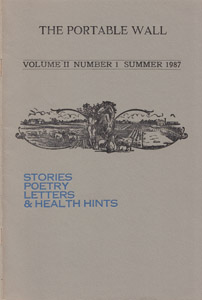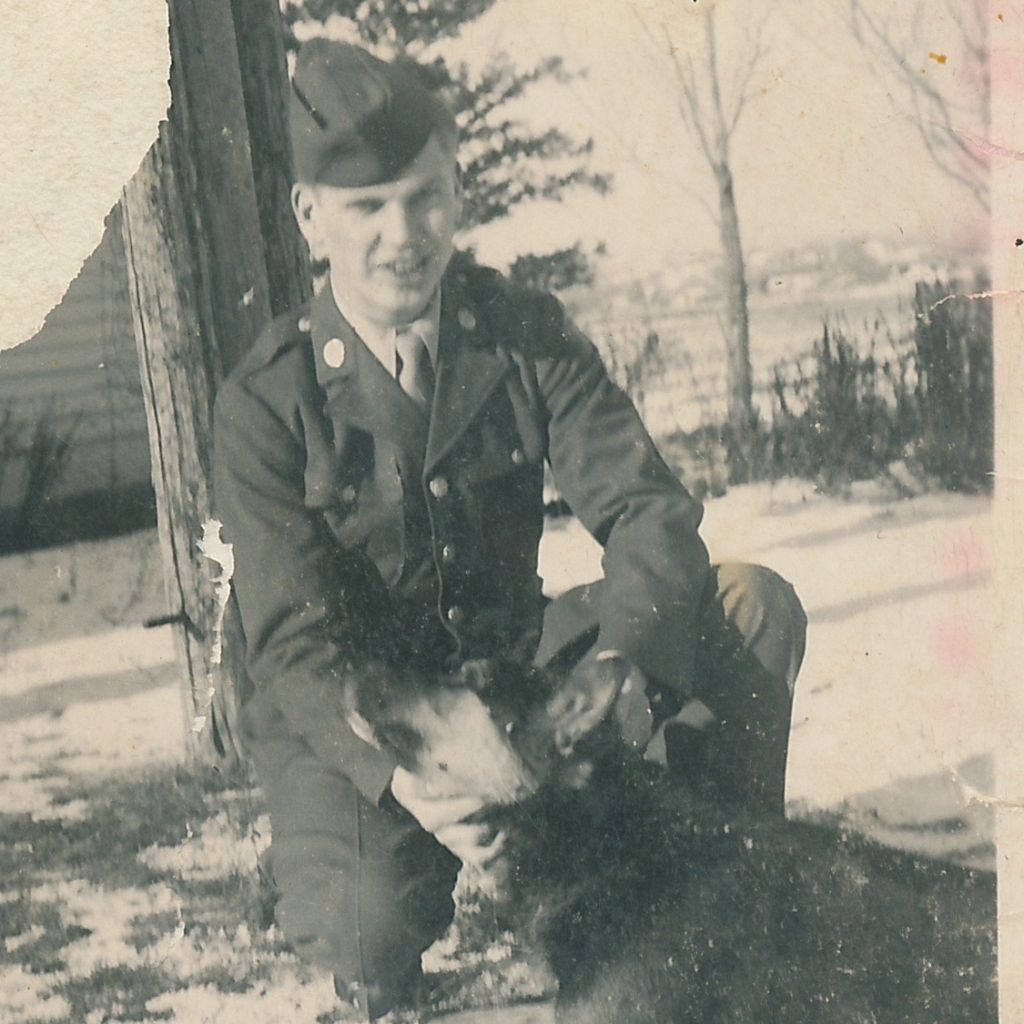
London, England, December 23, 1944
Carl — his family called him Buddy — was in England, in the army, an hour by train from London. He was sitting on the step to the brick barracks at Camp Piddlehinton.
Things sure looked different now that the US had practically won the war. After D-Day, the allied forces pushed the Germans out of France. The rumor was that Hitler was on the verge of quitting and accepting whatever peace terms were thrust upon him.
Buddy didn’t know what to do with himself, so he stood and returned to his bunk with the straw mattress inside the barracks. He collapsed on it. About that time, Hank showed up, a tall lanky guy from the mortar section, with enormous feet. “Let’s go into town, Carl,” he said. “Let’s go see the sights!”
“You know there’s more to life than ‘sights,’” Carl replied. [Pause.] “There’s great big bouncy babes, too.” They laughed.
Carl grabbed his tie from the foot of his bed, inexpertly tying it as they walked over to the command tent where they could get 24-hour passes to town. With the Germans on the run, passes were easy to get.
Inside the tent, Carl and Hank had to stand for a few minutes behind five or six other GIs who were waiting to speak to the clerk who worked for the First Sergeant. The men called him the “First Shirt.”
Sure enough, the clerk filled out passes for them. They didn’t need to be back until the next morning at 11am. Christmas Eve was Sunday and the men had high hopes of spending some of their pay on presents for their sweethearts and for their families back home. Carl was hoping to do a little bar-hopping with his friends, maybe get drunk, then “va va voooom,” he thought, smacking his lips. He hoped to kiss beautiful British women. Hell, he heard there were plenty of women in London who would do it in a doorway for a pair of black market silk stockings or a carton of Lucky Strikes.
The train station was about six miles away in Dorchester, so the men stood by the road with their thumbs out. Soon a soldier they recognized as a general’s aide stopped his jeep for them. He was able to give them a ride the whole way. The clerk had to meet someone from the train station, top secret, he boasted.
The train car was wooden–wooden seats covered with plush cushions–wooden walls, varnished and shiny. The locomotive spewed huge clouds of black coal smoke. Luckily the wind was blowing from the land out to the channel that morning, because the cloud didn’t gag the men in the train as they headed for London. The group had the above-mentioned Hank and Carl, but also Bill Loughborough, Bill Moomey, Al Salata, Maurice O’Donnell, and Randy Bradham. Enough to start a game of bridge, even though they’d have to stop playing in just over an hour.
The train took them to Piccadilly Circus in London and they all piled out. Some of the men went to find something to eat. You could get fish and chips almost anywhere for a shilling. A couple of shillings and you could get a warm English beer, too. Only the beer in England was a true pint, way bigger than American beers.
Carl managed to slip away from his friends, saying he wanted to go browse a store for a chess set. He did this after all his friends committed to going to a show. A burlesque show with honest-to-goodness women with big, bouncy breasts.
Here’s where the story gets murky. Bill Moomey and Hank Anderson swore that Carl returned to the camp with them, but Bill Loughborough said he wasn’t quite so sure. In any case, subsequent events didn’t permit any easy answer to this question.
Chapter five
Standard Street apartments in Santa Ana, California
Penny and I married in Lewistown, Montana, January 30, 1971. She and I had a brief honeymoon: we went by train from Bozeman to Missoula where we stayed a couple days in the Palace Hotel, in a room with a noisy radiator that had been painted silver. I don’t know how we got around after that. I think we walked. Somehow, we got to my mother’s in Dillon, perhaps by bus.
Penny lived with my mother in Dillon for several months while I returned to Santa Ana to the helicopter squadron.
For those months, I continued to save nearly all of my military pay–about $100/month– at the base credit union. I lived in the barracks and ate in the mess hall. I needed several dollars a month to buy razor blades and laundry detergent, two items I couldn’t live without.
Each evening after work, I changed into civilian clothes and I bicycled around Santa Ana looking for an apartment to rent. I gravitated toward the majestic old bungalows with rooms to rent and shiftless looking people hanging out. I was a hippie at heart.
Then I got serious. I checked out the places other Marines rented. I found a modern-looking, if cheap, apartment on Standard Street in Santa Ana for $115/month. It looked something like a two-story motel with an inner courtyard. Other, similarly designed places, had swimming pools, but ours didn’t. The place I rented was on the second floor. An avionics guy from Texas in my squadron lived with his wife a few doors down from ours. He had a Volkswagen Bug and offered to give me rides. I had a bike, though, so I didn’t take him up on his offer unless necessary. He gave Penny and me a ride to Saint Joseph Hospital when Todd was born.
I asked around the helicopter squadron if anyone knew how I could earn some money. A gruff sergeant, who ran the group mail room, helped me get a job cleaning a Xerox regional office a few miles away. I had a bike to get me there.
Penny joined me in Santa Ana, California, in April, with a suitcase full of sheets and blankets and towels. Sergeant Bobby Haines drove me into Los Angeles to LAX to pick her up and drive us to our Standard Street apartment.
We had a dining room table, chairs, and a bed. Our books, most of them given to me by Corporal Jim Harrington, were lined up on the floor. Penny’s radio didn’t work. I kept my bike in the living room. As soon as I could, I bought a $50 radio with our savings.
A Stater Brothers grocery was on the next block, and Penny bought some rice, cheese, and cauliflower. I bargained with a produce man for a wooden orange crate to make a small bookcase. Cost me a dime. I bought a square iron skillet for a dollar, or so. I don’t know. Round ones looked so ordinary. I found a piece of weathered driftwood about a foot long and put it in our living room as an art object. Everything looked so plastic in the city. I needed something earthy, like a piece of driftwood. I’ll bet it’s around here somewhere, even fifty years later, like the square skillet.
The only recreation we had was reading to each other. Penny read aloud Monkey, a Chinese Folk Story, translated by Arthur Waley. When she finished, I read her Don Quixote, translated by Putnam. I was still reading Don Quixote when Penny was in labor with Todd.
Each morning, I cycled through the Santa Ana orange groves to the helicopter base where I worked until 4:30. Then I pedaled home to eat the cauliflower, cheese, and rice that Penny cooked. We couldn’t afford meat. We kept a notebook to record our expenses.
After supper, I bicycled to my evening job cleaning the Xerox building. I got shit from my boss for talking to the other cleaners. My supervisor was the same sergeant who worked in our squadron mail room, a depressed-looking guy who didn’t like me to lean on my broad dust mop and talk. I quoted to him from the I Ching that said words to the effect that a little recreation makes the work lighter and improves morale. The sergeant scowled, but I didn’t care.
I studied the Xerox corporate amenities that got more elaborate as I proceeded down the hallway and upward in the chain of command. Here’s what I noticed: The pipe tobacco of the vice president was Balkan Sobranie; in the president’s office, it was Black Mallory. I remembered Peter Koch telling me, back in 1969, about Black Mallory. Finest tobacco anywhere, he said.
The regional president had his own shower and dressing room. Vice president had a large waiting room, but none of the other stuff. Down the chain, the offices got smaller.
As we workers cleaned our way down the hallway from the apex of power, I noted a curious phenomenon: the number of staples in the rugs increased exponentially. We picked them out of the carpet with needle-nose pliers.
In those days (1970s), computer work meant punching eighty-column key cards. I never found out what all those staples were used for.
I’d get home to Standard Street about nine each night, ready for more reading.
Todd was born on April 29. I was in the maternity waiting room when Dr. Wing came in. “Mr. Struckman, Mr. Struckman, what do you want?” he asked.
I stood up, puzzled by the question. I replied, “A cup of coffee?”
“It’s a boy, Mr. Struckman!”
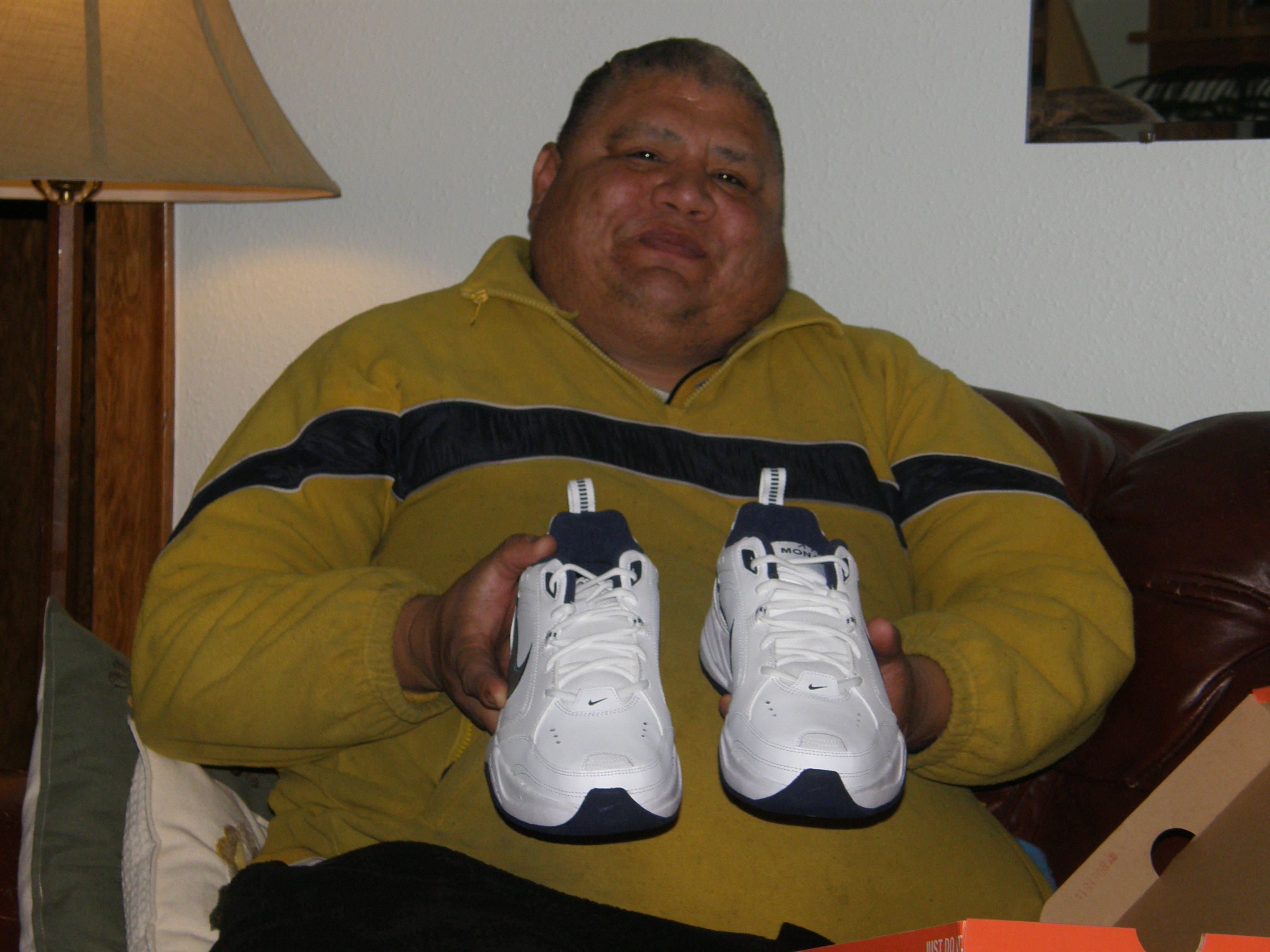
August 16, 2019
In my almost 30 years with Mr. Eddie (Snowbird) Alden, I sometimes said to myself, Wow. Someone needs to write a book. He was unique. Several people remarked on his singularity at his memorial service, that lasted two hours and forty minutes. Eddie was unique. I have never seen anyone even remotely similar to him. His life made sense to him. He was his own boss, a crime fighter. Like the Green Lantern.
Several times I asked him if I could call him Snowbird. “Call me Eddie,” he said each time.
Eddie was an iconic figure in Billings. He weighed more than 300 lbs, always wore a bright yellow fleece, unless the weather was hot, then he wore a clean white tee shirt. He pedaled slowly across parking lots, across streets. His hair was always cut short, less than a quarter inch. He had vertical black stripes on his scalp where his hair was a bit longer. He wore white Nike sneakers, white cotton socks, black sweat pants, the bright yellow fleece. He owned perhaps a dozen of those fleeces, which he stored at a unit on the West end of Billings. I helped him take a lot of his belongings from an apartment near 6th Avenue. As we drove away an old guy, perhaps a property manager for the basement apartment, called out to Eddie, “Don’t come back!”
Aside from angry landlords, he was well known, even loved; but sometimes hated. One Crow man told me as a child he remembered seeing Eddie and was afraid of him because he sometimes lurked at the corner of buildings.
How well known was he? This blog you are reading typically attracts one or two readers a day, sometimes as many as ten, when I write about picking up my small dog Gunther’s poop in the neighborhood.
The day I wrote about Eddie’s funeral service I got more than 500 readers! I think the most I had ever gotten was around 30, when I wrote about being depressed. I always took for granted that my blog posts are dull.
The day after that, the blog post about Eddie attracted nearly 8,000 readers! That number was back to about 500 today.
Eddie always liked publicity. I think he would be thrilled to know how his story attracts people.
Three days ago, Eddie’s memorial service was held at the Spirit of Life Four Square Church, in Crow Agency. Right around the corner from the old Crow Mercantile, which was across the street from the Post Office. I’d say 30 people attended, including four or five of us from Billings.
Eddie’s service was gorgeous, elaborate, beautiful—all those things. Two of his bikes were on display with his trademark 64-ounce Big Gulp soda holder. A two-liter Pepsi bottle, some cologne, a couple of radios, tape recorders, yellow fleeces. Lots of little touches. Grocery bags hanging from his handlebars. He didn’t always use plastic bags. He started out with paper bags, each reinforced with a half-roll of duct tape. Probably that was before he was settled in Billings, complete with lots of bicycles.
Over the years, I often asked Eddie questions and he would answer cryptically, “Yeah?” Example: “Eddie, are you coming over for Thanksgiving?” He would answer, “Yeah?” Me: “Is your apartment clean?” Eddie: “Yeah?”
The people at Eddie’s funeral extolled his virtues, which are approximately the same as those of any officer in law enforcement, except Eddie invented his own, volunteer, role. They said Eddie had some sort of disability, but he valued his family’s tradition of police work. Generations of policemen (and women, perhaps). Therefore, according to Eddie’s uncle Art Alden, “Snowbird had a siren on his bicycle.”
I think I’ve gotten ahead of myself again.
Eddie did not say much about himself, unless asked specifically. Even then, he was often vague. Example: “Eddie, what are you doing tonight?” Answer: “Oh, you know, routines.” I learned later that “routines” referred to the route he pedaled his bicycle.
I was shocked to learn that he had enemies. Oh yes. They were often his victims—people he turned in to the police, usually when intoxicated, often when driving.
One year at Crow Fair, which is a huge annual encampment each August of literally hundreds and hundreds of tepees—possibly more than even one or two thousand—I found Eddie pedaling his bike on one of the many curved roads. Typically, Eddie wouldn’t recognize me right away. The reason: non-Indians, like me, all look alike. But I called out Eddie’s name and he pedaled slowly to me. I never saw Eddie pedal quickly. I had driven over to Crow Fair early that morning for the annual “Teepee Creeper’s Classic” three mile run. I was expecting breakfast at a relative’s camp, so I asked one of the women there if I could invite “Snowbird.” She said, “sure.” I didn’t know it, but she was just being ultra kind and polite to me!
She fried up a rasher of bacon, which Eddie ate from a paper plate. Soon, my son pulled me aside. He told me that more than a few people in that camp had spent actual time in jail because of Snowbird’s ratting them out. I was never never NEVER to invite him to breakfast there again!
That’s when I learned of Eddie’s “zero tolerance” for the crime of possessing alcohol on a dry reservation. Both the Northern Cheyenne and Crow reservations are “dry.” Eddie also had zero tolerance for any natives that crawl out of a bar and get into a motor vehicle in the small hours of the morning when the places closed down. Eddie would certainly call the cops on them and that might result in going to jail.
But Eddie didn’t mind at all if I drank. He even provided me with wine the last few years at Christmas. Always great generous bottles of pink, or this last Christmas, merlot. He had gone to some trouble to find out what kind I liked. Last Christmas I sat with Eddie and drank a few glasses of the merlot. Our conversations went something like this:
Eddie: Dan?
Me: Yeah, Eddie?
Eddie: Dan?
Me: What is it, Eddie?
Eddie: Does Jon want to buy me a gift card for the Holiday station for Christmas?
Me: How would I know? Why don’t you ask Jon?
Eddie: Yeah?
Sometimes I bought Eddie black sweat pants for Christmas, sometimes shoes and socks. One time, I bought him a 12 pack of Mountain Dew, which I wrapped in shiny paper with little trees on it. After he unwrapped it, he put it on the floor. He looked at it, then at me. “This is it?” He didn’t bother to take it with him.
That’s why I often said that I didn’t really know Eddie that well, despite being acquainted with him for almost 30 years. Part of the problem was that I frequently was critical of him. I scolded him for teasing the Bureau of Indian Affairs police officers by carrying around pop in a Budweiser beer box at Crow Fair.
I got perturbed when he got into trouble, usually having to do with his relationship with a landlord, and he asked four or five different people for help, but didn’t tell any of them about the others. “Eddie, you need someone’s help,” I said. “But you don’t need four people who each think they are the only ones helping.”
Eddie kept his business to himself. He frequently lined up several unrelated groups to help him celebrate his birthday. On the big day he stopped in at one after another: the police department, legal services, the Billings Gazette, my house, his sister’s house. When things went well, he couldn’t help exulting.
I didn’t know Eddie 30 years. I knew Eddie 1 year, 30 times. I miss him because his independence delighted me. A legend in his own time.
I criticized Eddie for hoarding stuff in his apartment. That’s one of the reasons he got eviction notices. His places were frightful.
I didn’t visit the last three places he lived because I felt depressed when I could barely fit through an aisle of plastic trash bags filled with filthy blankets, gray sheets, phones, sweat clothes, socks, batteries, tape recorders, hair clippers, bicycle parts, radios, cameras, new bike helmets (never worn—I don’t know how often I urged him to wear his helmet. His answer was always, “Yeah?”)
Pill box organizers, prescription bottles, envelopes, newspapers, hunters orange gloves, empty soda containers (large) cologne bottles, more envelopes, posters, tools, telephones, more telephones, more bike parts, underwear, camping gear, televisions, fake flowers, food wrappers, bottles of cleaners, vacuum cleaners, neck ties, suits, mattresses, more radios, toy police cars, flashlights, flashlight batteries, a bull horn, a siren, blue and red flashing lights, more toys, hats, hats, more hats, coats, old shoes. Garbage. Newspapers. Like 40 copies of the same date.
Fire crackers, bottle rockets, matches, other toys, an empty whisky bottle, pepper. More pepper. Thirty cans of black pepper. And telephones, police scanners, police scanner parts, bicycle seats, bicycle wheels, tires, tubes. More receipts, paper, a huge pile of bike wheels, bike frames. A couch, under there somewhere. ID cards for random people. Panty hose. Telephones. Cooking pan on the stove, with grease.
I’d ask Eddie the last few years: “Are you keeping your place pretty clean?” He answered: “Yeah?”
“Really?” I continued.
“Yeah.” He said. Well, I couldn’t vouch for his honesty in that regard, but I never checked.
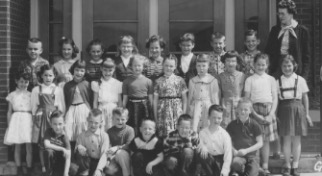
When Mrs. Daisy Jacobs taught our second grade class she spent time after school with the neighborhood tough kid, Sonny. He threw rocks at our feet. This kept him from getting in trouble because the bruises didn’t show.
Sonny chopped his brother’s index finger off with a hatchet. His brother Raymond was the nice kid in their family, but Mrs. Jacobs didn’t have him in her class.
I don’t know how often we filed home past Mrs. Jacobs and Sonny, who were whispered to be having a heart-to-heart about his behavior.
Mrs. Jacobs bought Sonny gym shoes because his parents couldn’t afford them.
My mother taught second grade also, after Daddy died, but not in the same school. I’m not sure how Mother regarded her, but I thought Mrs. Jacobs was a great teacher because she liked me. She correctly predicted that I’d be a pharmacist some day. Well, she said that my interest in chemistry could help me.
Moreover, she lived just a few blocks away, so I often walked past her house where she and her husband had their store, the “Food Center.” They had no children. She looked in my ears when she caught me walking past. Said she could plant potatoes in my dirty ears.
Mrs. Jacobs was mid-career in the early 1950s when I had her for second grade. I learned that during the 30s and 40s, teachers were exposed to the progressive ideas of a pioneering educator, John Dewey. He taught the concepts of respect for student diversity and student-centered learning, ideas congruent with the methods of Mrs. Jacobs. I learned about Dewey when I Googled “teacher training in the 1920s.”
I also learned teachers then were beginning to form unions. In Montana it was the Montana Education Association and the National Education Association. Mrs. Jacobs expressed pride in her profession and her loyalty to the union.
Last week P. and I drove our van from Poway, CA, to Saint George, UT, to meet up with our high school age grandson, Cyrus. He and his friend have been driving around the west camping for their spring break in the folks’ car. We kept in touch by texting.
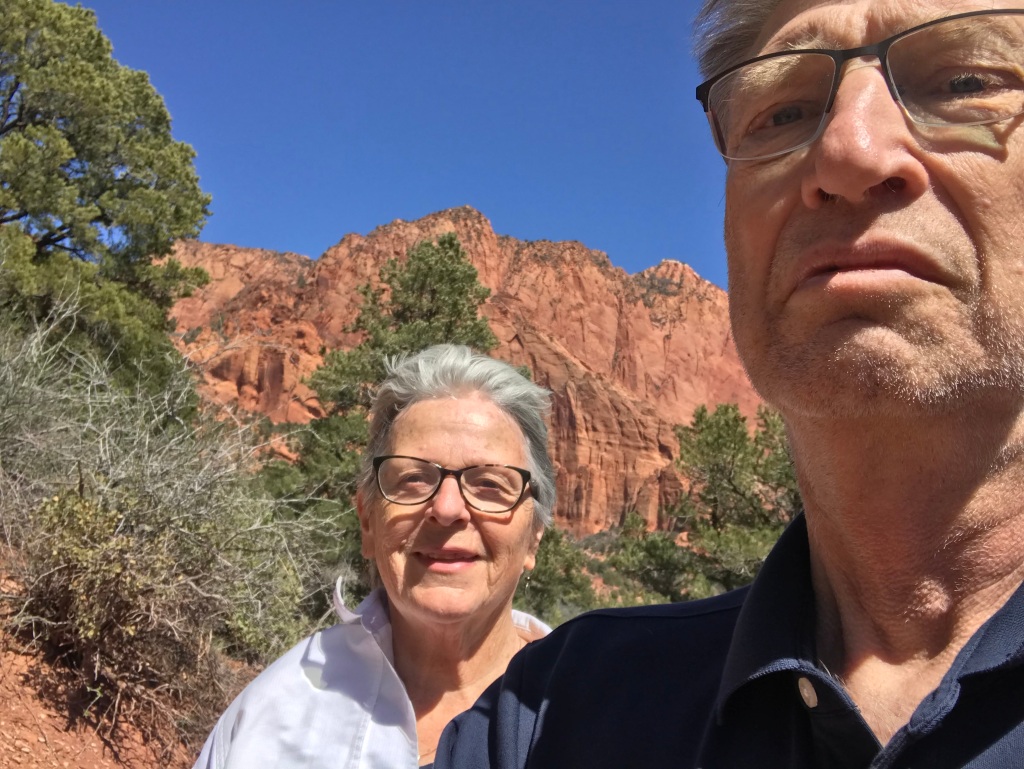
Cyrus’ dad, Todd, assured us that they would go with us anywhere for camping if we offered them shrimp scampi. He advised us to stuff a wad of money into Cy’s pocket. Later Todd told me he was kidding about the shrimp scampi.
Our first night, near Saint George, was dusty because we camped near a dirt road. On a road, really. In the morning a line of volunteer firemen lugged ropes and gear to practice vertical rescues. We drove to Zion NP, hiked. Cy booked 2 campsites near Virgin, UT.
From Virgin we drove a couple miles on a narrow unpaved road. Climbed to a vast meadow, a dirt road cut through. Nearby fence and trees. Distant cliffs of orange, pink, red rocks. Evening. Only a hundred meters across the meadow we turned off to a stone fire ring. We weren’t far from a wire fence and a cheerful, blue, porta potty.

I wanted to use the commode. Headed for it. Maybe a couple hundred feet.
The meadow was sparser than it looked at first. Less grassy. A few widely scattered cow pies. Old ones, dry. I soon reached the blue, plastic, portable commode. I wondered if anyone ever cleaned it. It looked bright and clean on the outside.
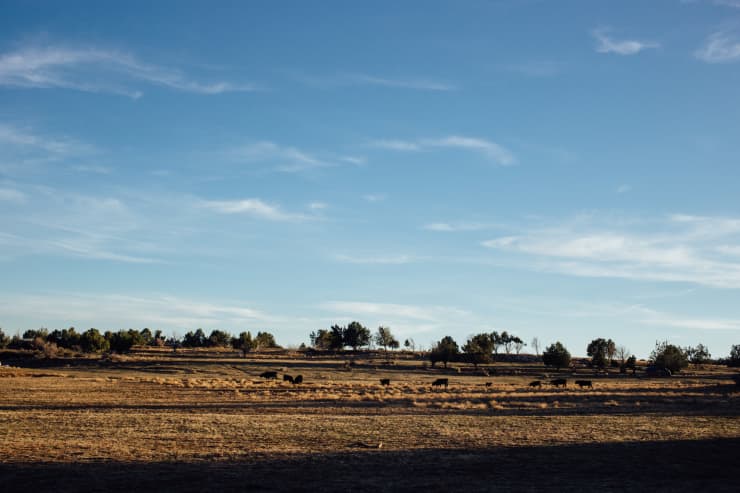
I heard flies buzzing as I reached for the door, pulling it open. Oh yeah! Thousands of flies. Mark Twain called ‘em God’s darlings. I hadn’t seen that many flies in one place since we camped in a Forest Service cabin years ago.
At first I stared in disbelief. I didn’t want to see what I saw.
Someone left the seat up. Usual disgusting sight. I tried to imagine sitting on a toilet with hundreds of houseflies buzzing in and out of the hole. Would they tickle my private parts? What about the thousands more flies buzzing random orbits, trapped with me if I closed the door? I hesitated. Again, I tried to imagine me dropping my pants and sitting.
I let go the door; it closed itself. I had to leave. I continued to hear the buzzing, albeit fainter, as I walked back to the fire circle. Of course, I wanted to tell everyone about the phenomenon I witnessed.
At camp, Cyrus set up the camping table and we ate jambalaya and chicken soup.
Then the youths and I played several games of Bananagrams (R). I did damned well until they got wise to me.
They told me how I’d been cheating. Embarrassed, I called their attention to four slender young men walking in a file across the meadow to the outhouse with the thousand flies. We watched expectantly. This was a pregnant moment, likely never to be repeated in this life.
The four men chatted indistinctly as they approached the porta potty. Three stood back, perhaps ten feet, as one approached the blue plastic door. The one with the latch with the green crescent that states “open.”
I watched Cy’s friend’s face. None of us paid any attention to our Bananagrams (R) game. Our eyes locked onto the man as he reached for the latch handle on the commode.
We saw and heard the man slap the door shut like it was hot. Then he and his companions filed back, marching the way they’d come.
Gunther got excited and barked at them. “Sorry!” I shouted. We looked at the table. Grinning.
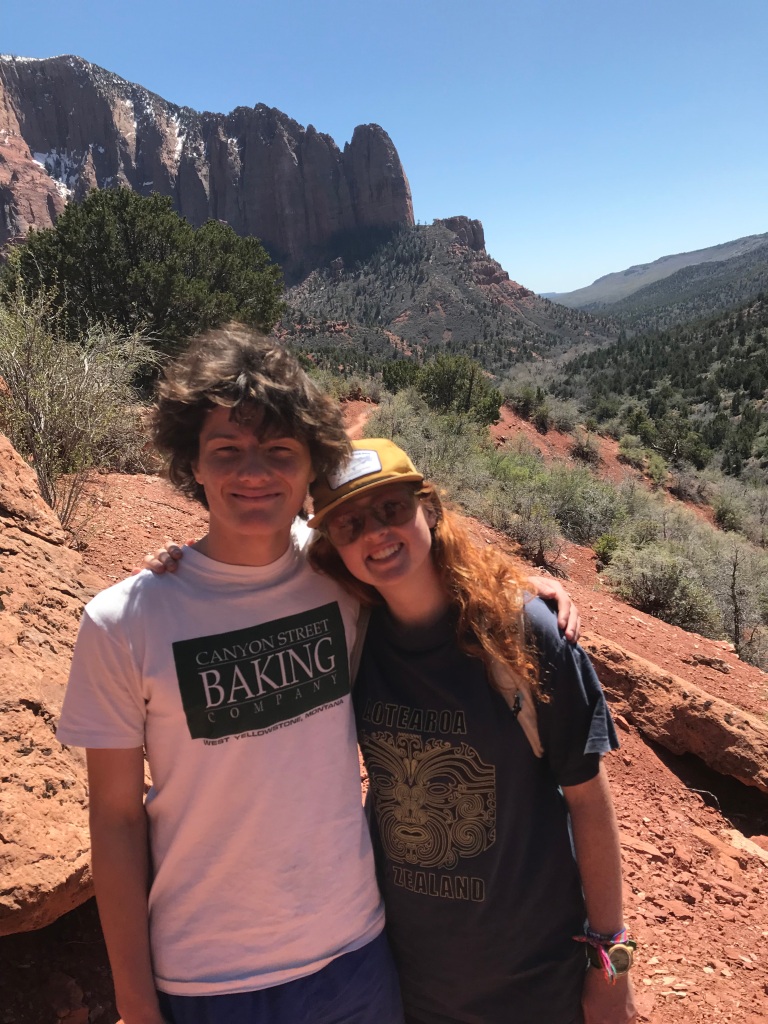
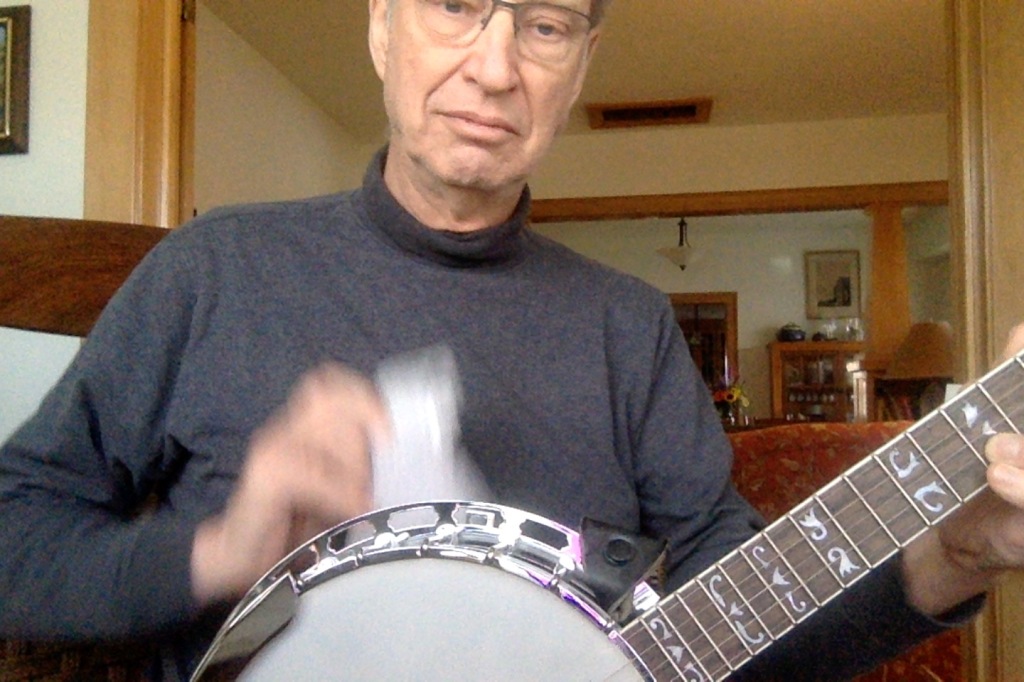
March 27, 2024
I was feeling like shit this afternoon so I picked up my banjo. A beautifully inlaid Fender I got three years ago from my sister-in-law when her husband died. Today, I tuned it by ear, the way I used to tune a guitar. A banjo is often tuned to an open G chord, but the strings can still be tuned relative to each other.
Clearly professional quality instrument. Nice heft, great tone. Loud, though. So, like I’ve done with everything else I’ve ever gotten, I took it apart. Well, I removed the circular wooden resonator from the back. Four knurled screws I removed with my fingers. It simply dropped off, once the screws were out.
I watched a youtube video of Tracy Newman introduce her banjo. She explained that she put a towel in to muffle the sound a bit.
I wanted to try the towel idea.
To my surprise, I found a pair of used cotton socks inside my banjo. White and gray cotton socks, balled up the way you do when you put socks together after drying. One sock had a hole in the toe. I pushed the pair up against the inside of the drum head, to get a mellow sound. Easy to tune, easy to play. With its own socks
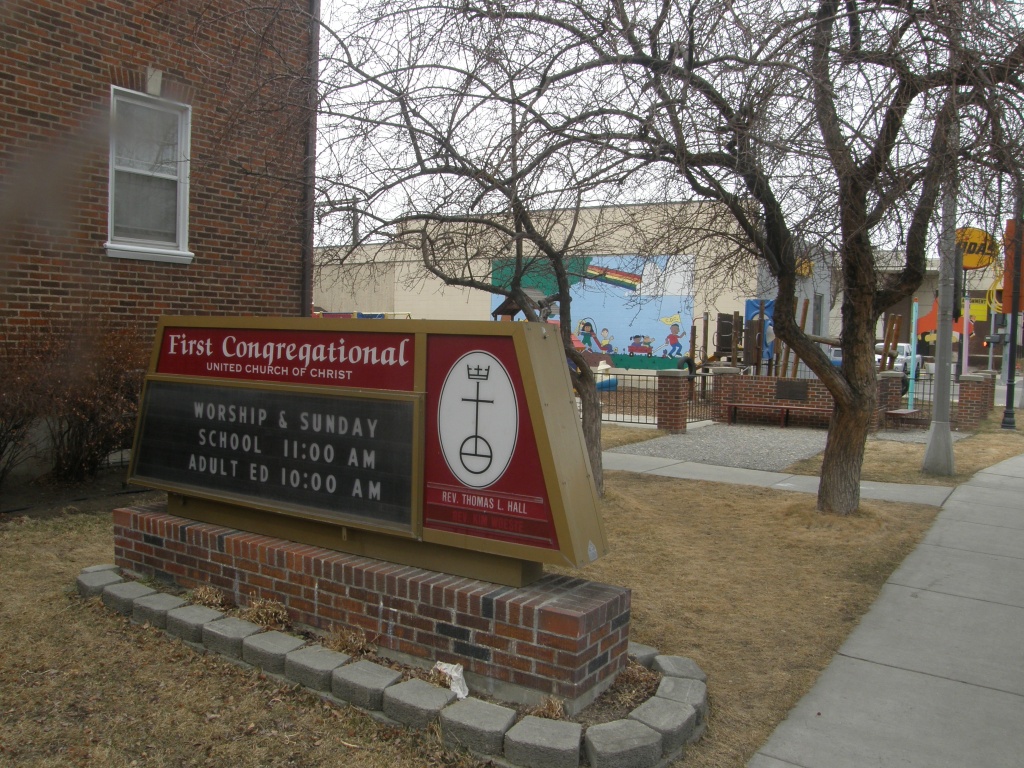
March 9, 2024
Not much to report. I marched downtown to First Congregational to attend Alice Lundgren’s funeral. She and her husband, Charles, were often friendly to me. Once, I saw Charles at the airport and he drew near with a broad smile, a handshake and howdy. He was wearing a back brace over his clothing. He was an old man. He died a few years back.
His wife Alice periodically thrust a $100 check into my hand at church. She represented Mayflower Circle, a women’s church group. They liked donating to Family Promise, a program to help unhoused families get on their feet. Alice was always as friendly as a puppy and I will miss her. That’s why I walked to her memorial service today. Also, P. had the car for an appointment for a pedicure.
My walk took me east on Burlington, past the YMCA, where many darted in and out. Probably basketball tournament time, I thought. Children shrieked in the cage-like playground. One child huddled atop of what looked like a giant tortoise. I guessed some parents work Saturdays, so. As I hurried east on fourth avenue across the streets I hoped a left-turning car wouldn’t cut my life short. Er … cut my long life shorter. None did. I crossed fourth avenue and continued to the church, oddly dark, considering a funeral was scheduled in a few minutes. At 11 a.m.
Nobody nearby. I used my fob to unlock the church door. Dark inside. I walked to the far end of the narthex and sat on the sofa where I once saw a fellow named Little Crow sit. With my phone I googled Alice Lundgren. Learned her service is May 11. Walked home, glad for the exercise. Almost two miles.
I won’t go on long about my disappointment that our Billings Public Library declined my recently published memoir, “How I Improved the United States Marine Corps. Stork’s Story.”
The librarian examined it and found that it meandered too much. I reacted several ways: A. I’m proud she read my book. (I’m used to paying someone $25/hour to read it.) and B. I’m sorry it meanders too much. It’s going to take me awhile to adjust to honest criticism. and C. I’m proud it was deemed worthy of her heartfelt criticism. I say, let the chips fall where they may. Books can be like our lovely children; beautiful to some, hideous to others. My tears still fall, said the Chambers Brothers, in their famous album, “Time Has Come Today.”
In general. I throughly believe the players on the streets of New York, the buskers who dance, juggle, sing, strum or somersault, hone their skills on the rough and tumble of casual audiences who are apt to shout “boooo” or “huzzah,” with equal ease. That’s how they become superb craftspersons. I will be proud to dig into my wallet for a $20 for them. In fact I was.
I feel the same is true of modern writers. Find a venue, I say, such as a blog or a Facebook post, to develop your craft, your art.
A friend paints his truth on canvas, sometimes on velvet. He hones his skills on the easel and coffee house wall. Or the local communal bookstore. We have such a store, and I’m proud of it. Called “This House of Books,” it employs a woman named Julie, who is encouraging to writers and painters. Make no mistake. Writers and painters can probably work without it, but they benefit from encouragement. What goes around comes around. That’s an old Cheyenne saying. At least, that’s where I heard it. Lame Deer. Montana.
But I digress.

March 5, 2024
The problem: my muse is an asshole. There. I’ve said it. I’ll dork around without inspiration. Nonetheless, I’ll tell my story, which is, frankly, dull. Well, depending on your interests. I am keenly interested in Gunther’s bowel movements (always in a wholesome way). See, we worry about the little fellow’s quality of life. That’s why we took him on a walk today to Riverfront Park, here in Billings. I love the parks here. Billings may have a dozen parks nearby, some with miles of trails. Sometimes wildlife.
P. drove us to Riverfront about 8 this morning, earlier than usual. Frost on the car. Snow gone. Morning traffic. We drove downtown first to mail a bunch of my books to Todd, who paid for the last printing. I sent another book to my late cousin Dick’s son, who lives in Tacoma. I was the only customer in the post office. I folded my receipt. Postal receipts, these days, print the address you’re sending to. I like that.
Anyway, Riverfront was quiet, except one man whistled for his dog and a flock of Canada geese took wing when Gunther trotted toward them. Mallards, probably 10-15, swimming east. Some of the lake was frozen. We hiked between several ponds with lots of cattails and rushes, but heard no redwing blackbirds. I heard a familiar bird, though, but I can’t name it. No robins. No deer. A man with a dog. Gunther and the dog drew close, but the other dog was larger than Gunther, and he shied, ran away. The old man with the dog said nothing, and neither did I, but I think both of us were glad the dogs had a sociable episode. Circling the lake, we walked about a mile and a third.
It’s been a quiet day. I napped and P. baked bread. About five we opened the 4th Avenue door of the First United Methodist Church, to put homeless families up for the night. It’s a hell of a lot more complicated than that, but we do help shelter families who would otherwise have to sleep in their cars. Many nights this week P. sleeps at the Methodist church as a chaperone. I spent a night there too. Several good friends from the nearby First Congregational Church have also volunteered to sleep over as chaperones. I must hastily add that we strictly avoid any proselytizing, or even any mention of religion, icon, writing, symbol, grail, shroud, or temple. Instead, we talk about writing, poetry, jobs, transportation, literature, basketball, military service, and stuff like that.
Last night, I was in the church kitchenette, I think you’d call it, and speaking with Paolo and Nancy. A youngster darted in and out. I mentioned how pleased I was with the youngster because he could “climb around the stair banister and railing like a monkey!”
Paolo smiled. “I delivered him a few years ago, you know.” In fact he is an OB-GYN and Nancy is an OB nurse.
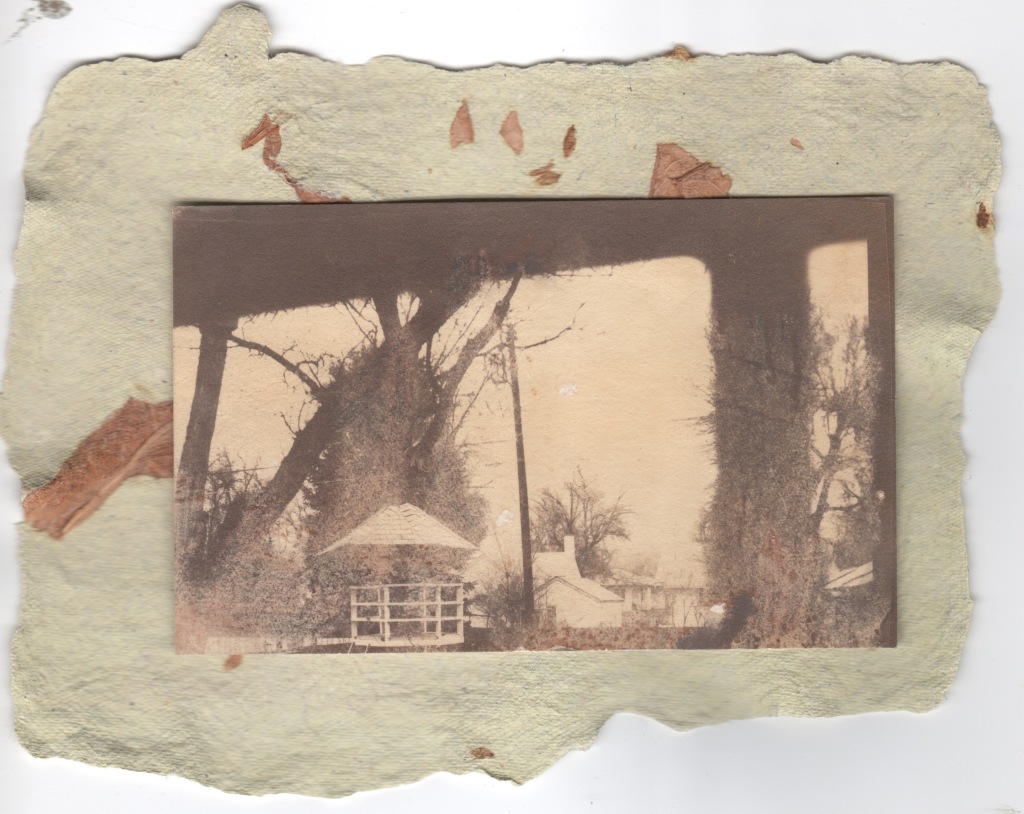
February 26, 2024
Several people told me they’d like to write a book.
“Ahem.” Now that I’ve gotten one into print, I’ll briefly share my experiences with you. Writing and editing and printing my book took about a year, but of course the stories came about over a much longer period. Years. My older friends, such as you are, all have a lifetime of stories. I call that material the mother lode that can be mined. Such a pleasure to dig them out.
I don’t write fiction well. I’ve tried making up stories and I’ve seen how the listeners disappear to do something else.
They seem to enjoy the ordinary truth, the deaths, loves, adventures, the injuries sustained.
Therefore, if I want a reader, I must write the truth. Wish I could say that I was not fearful of consequences. Many times I was, tossing in bed, bad dreams. Are you still with me?
PHASE ONE
I guess phase one requires reflecting on life. Going through old photos and letters helps. Talking with the people in the photographs is a boon. They are apt to remember the obscure details, the jewels that make the story vivid.
Here’s an example of a story.
In 1967, we were seniors in high school in Dillon, Montana, restless, physically strong, intentionally inscrutable. We loved to do the forbidden, freely using alcohol and tobacco, climbing up and down the mountains in the Pioneer range, doing pranks in town, trying to write a comic book of our own. We made 3-4 8mm movies from scripts we scribbled the night before. The super hero comic book would have been printed on an A.B. Dick stencil duplicator. We did a couple of pages before our plan fell apart.
That February, Tad Henningsen and I were into climbing. Rocks, buildings.
During the week, we scouted downtown for buildings to climb. Skeet’s Cafe had a sort of tower over the front door. It probably still does. We selected a route to climb to reach the rooftop pinnacle, starting at a nearby building, mounting a wooden stairway on the alley.
As we started the route, I had to pee. At the top of the wooden stairs I peed on the back steps of what turned out to be a rooming house. In those days Dillon had several blocks of buildings with rooms to rent. Homeless old farm workers and ranch hands lived in them if they had the few dollars to pay.
Turns out the route up the back stairs didn’t lead to any route to the roof, so we hustled down to the alley again.
A woman burst out the door I peed on. “Go in the alley,” she shouted. “Don’t pee on my back steps.” Tad and I looked at each other. We yelled some double-talk we’d been practicing: “Odd’n guy’n yank ’n took ’n sissler off my bubble,” we shouted.
“That’s no excuse!” the woman shouted. (We jogged away, giggling.)
The details, the jewels: the barbed wire someone strung to keep us from jumping roof to roof. The injury to my first finger from the barbed wire. The night time visit that trip to Dr. Seidensticker to have my finger stitched up. The jokes Dr. Seidensticker told us. (Why is a turd pointed at both ends? To keep your asshole from slamming shut.) Dillon is at high altitude; February can be brutally cold and windy. We were invincible teenagers. I didn’t own an adequate coat. I had a vest I borrowed from Les Gordon that looked like a gorilla. Our Converse All Star shoes had holes in the tops over the toes. We studied the art of “not caring.” Except we did care. We wanted to seem to not care, in order to escape the adults in our lives. We wanted to be outlaws then.
Stories. We all have them. They are good and necessary to tell.
Thus, we have the raw materials. How do we turn those incidents into stories?
Answer: find a kid. Nephew. Grandchild. Any audience will do.
Sit them down. Tell them what happened in a straightforward way without much elaboration, except for those golden details. Like the barbed wire. Perhaps mention the Redwing Irish Setter Boots with Vibram soles you bought for rock climbing. If the kid clambers for more, keep telling the tales. Show respect. Stick to the truth. At your age, you don’t have much to lose.
You need a platform to share your writing. I recommend WordPress. You can start your blog at no cost. Link your entries to your Facebook page. That way, you can develop your voice. People know when you tell them the truth. That’s your voice. It is your only salvation. Nothing else will do.
I think you need a group, or at the very least, a coach. You need someone to kick you in the rear and get you writing when you don’t feel like doing it. Coaching costs money. I’ve paid $25-$50 an hour for sessions, in which we talked about writing. Less money gets you the same result. You can get your coaching on the phone from any licensed counselor. This coaching works because you don’t want to waste your money. If you don’t write, you betray yourself.
Nine years ago I signed up with noted Billings author, Russell Rowland, who led a writing group of about twelve. He had us meet once weekly, each of us submitting a manuscript. We took turns reading to each other and criticizing. I attended two of Russell’s excellent 12-week sessions. I’ve made friends with most of the other attendees. I recommend joining such a group. Helps you find your voice, which I said before, is the chief thing. I remember when I wrote a story about the first time I experienced sexual intercourse, I felt so ashamed, that I was afraid to attend the next group meeting. I showed up the following week, but I felt chastised by the group for withholding my story. Nonetheless, I eventually shared with the group. Afterward, I didn’t feel unique, because all of the others (I think) could have told a similar narrative regarding their sexual adventures.
You will continue to write your stories, paring them down, bolstering them with great details. Once you collect the stories, you can start your research, by far the most enjoyable stage.
For me, research was picking up the phone and calling old friends. I told folks what I was doing. I learned people don’t necessarily want to be portrayed as teenage criminals. People, like us, were obtuse and foolish. Your old friends will help you moderate your language.
I kept a yellow pad at my elbow to take notes of what my old friends said.
I’ll admonish you not to be afraid of telling your stories. Aloud, I mean, even if you’re thinking of writing a book. I believe that is good advice. You might hesitate to tell your best stories, perhaps fearing the story will have been used up, like a joke you wanted to tell. “Stop me if you’ve heard this…”
Instead, I want to assure you that repeated telling of a story can help you pare the tale to its best version. Tight, terse, telegraphic.
We’ll talk more, later.
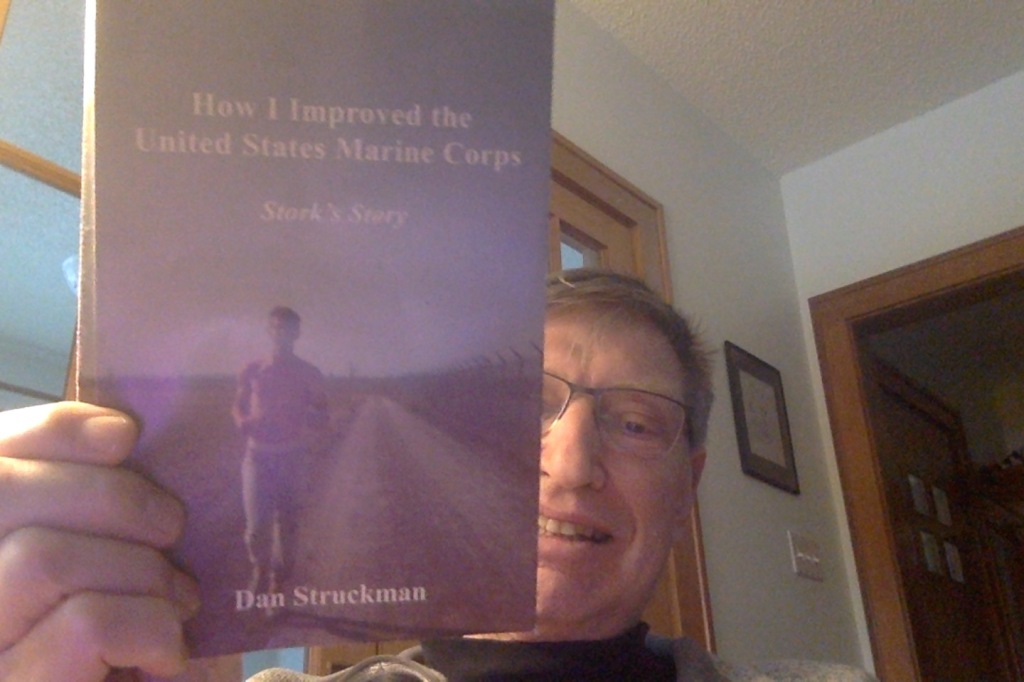
Pictured is my memoir. No. Me holding the cover of my memoir. I’m attempting to smile, sort of.
Two women and I gleaned stories from my blog, “Insearchofbud,” arranged and rearranged them into a sort of timeline, then edited the hell out of them until every last comma, semicolon, and dot had been scrutinized and chased from one clause to another. Even then I misspelled the word “excreta” (but we caught it before press time). We finally agreed it was done. Well, almost agreed. Actually, we disagreed.
Publishing a book has been like . . . sitting with a laptop for many evenings, summer and winter. Making diagrams on a yellow legal pad. Researching by phoning and emailing old friends. Good times, really.
Who cares about the life and times of an anonymous pharmacist (like me) in eastern Montana? I kept asking myself. On the other hand, who much understands the answers to the deep questions. Sex, mainly. Dogs, too. And women! What is common sense? We have way more questions than answers. Why do I have such persistent feelings of depression?
More and more God looks like a wise old black woman. The Book of Changes tells me the Creator’s image is the sky, or a strong horse, or a dragon, permeating everywhere, all the time. I’m good with stopping at “the sky.” I’ll take a rain check for the others. What is the nature of reality?
Who cares about the life and times of a retired, anonymous roofer in Phoenix? Truth is, he’s way more than just a “retired, anonymous roofer.” I’d like to tell his story next. Also of his dog, and his guitar collection. I mean to tell about his friend who took our hero’s ten dollars for an ounce of weed, and forty years–no fifty years–later, no weed. Not even an apology!
My friend in Phoenix is a Trumper. He started out like me in Dillon Montana, was a hippie, played rock and roll music, liked cannabis, hated the thought of hurting another person, so successfully became a conscientious objector during Vietnam. He is the same good friend as before, but his reality and mine are poles apart.
He claims to have forgiven our friend who absconded with his ten dollars. But neither of us can forget what may well have been a small lapse of memory, inconsequential. Well, not inconsequential. I went from Seattle to Fairbanks with only ten dollars and my charming wit.
My book. I’ve been through it so many times, I hope you can find something new in it. I don’t have it yet. The printer said it’d take 10-15 days. Business days, then they’ll ship it to me if I send them hundreds of dollars. It’s good.

Leslie Fiedler wrote:
This world is the only reality available to us, and if we do not love it in all its terror, we are sure to end up loving the “imaginary,” our own dreams and self-deceits, the Utopias of the politicians, or the futile promises of future reward and consolation which the misled blasphemously call “religion.” The soul has a million dodges for protecting itself against the acceptance and love of the emptiness, that “maximum distance between God and God,” which is the universe; for the price of such acceptance and love is abysmal misery. And yet it is the only way.
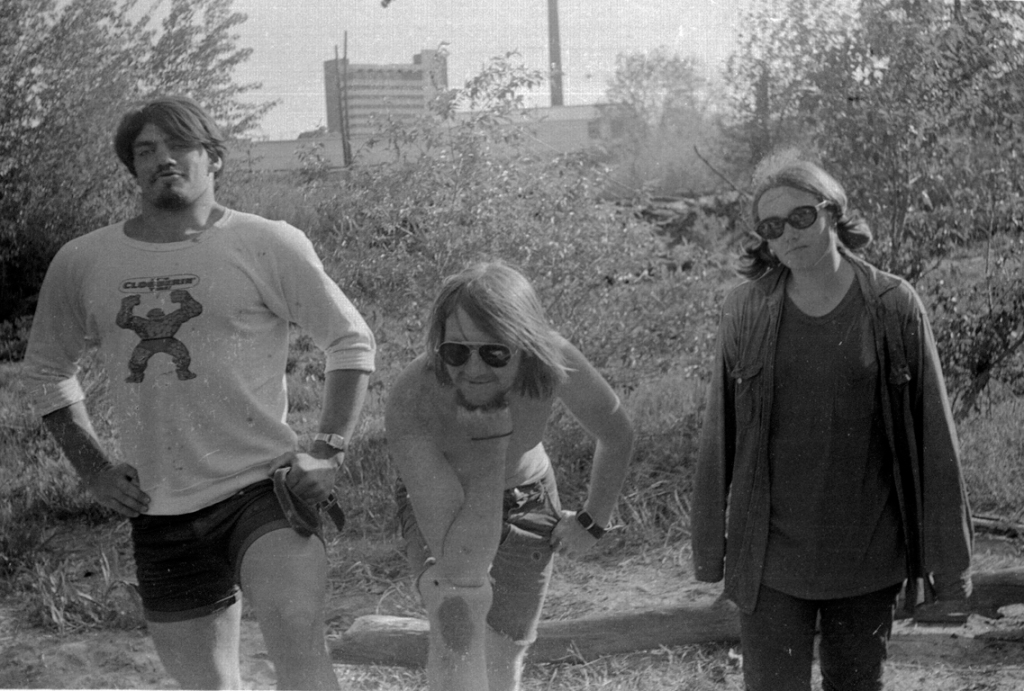
Duck stands next to Steve the Star and Becky Home Eckey.
January 8, 2024
Phoned Duck today to ask him if I could write about his life. He and I are on opposing political sides at this late stage of our lives, yet in the seventh grade we were tightly aligned. We were good friends. We still are. Duck is a Trumper. This put me in such a depression that I couldn’t talk about it. I still feel ill in my stomach. The trouble is, I love and admire Duck. We grew up together, although for many later years, we’ve been far apart geographically and politically.
I told Duck I wanted to interview him because I am fundamentally certain of his good will and his personal honesty. Along with our deep roots together on this globe, somehow he is on the north pole and I am on the south.
“But we’re on two ends of the same earth,” he said.
I ended my pitch noting that I thought if I could understand his view of the world, of the universe, it might make sense and I would be better off somehow.
Imagine a world of bubble people. Each one projects a unique mental “reality” superimposed on the world as he experienced it. This model includes the concept of (1) an ultimately true phenomenal existence (reality). And (2) many people who experience that the world differently, based on the above mentioned mental states. The potentiality is called an “entelechy” in the I Ching.
I’m exploring the basis of our differences.
He felt sorry for me when I first moved to Dillon, Montana, because I was alone and Kirk gave me the daily “Struckman treatment” whenever we walked home from school. Jim Feathers was another who walked with Duck and me. I don’t even remember what the Struckman treatment was. I’ll ask Duck about that the next time I call him. Duck said he didn’t like that I got the “treatment.”
We talked for about an hour. Finally, Duck told me his dog, Louie, that he’d feed him soon. In favor of Duck feeding his hungry dog, I excused myself and hung up.
I mentioned that I long admired Duck for his truthfulness. He said something happened to him before puberty that made him want to tell the truth. He declined to tell me until later. I thanked him for that.
The way Duck mentioned the “Struckman treatment” and his regret that he didn’t protect me, made me think maybe Duck has thought about it since with repentance. I barely remember it. I think I was bullied.
Duck remembers when Jim Feathers, he, and I were exploring the buildings at Western Montana College in Dillon in the 8th grade. He noted the custodians had trouble with us. Duck said we were hiding in a men’s room from the custodians. Suddenly, Jim made noise and ran to a window and wriggled out. Duck and I followed him, he said. (I have a slight memory of this. Did it happen that way?)
He suffers from chronic heart failure bad enough that he is short of breath. Also, emphysema, but not severe enough to require oxygen. He said he monitors his vital signs and weight fairly closely. He has to. He also complained of gynecomastia. I observed that I have large breasts too. I told him I wear a bra. Then I told him I lied about the bra. I’m thinking he lied about the gynecomastia also.
I enjoyed speaking with Duck today. He played his bass guitar yesterday at church. He played his fretless bass, not his five-string. He mentioned that he has only six guitars.
His brother, David, visited him several weeks ago at his home in Phoenix. Well, a little north of Phoenix.
We reminisced about Jim Feathers and Larry Felton, two acquaintances who became archaeologists of renown. Also, people from our hippie days who continued to make music. Bob Bartmess and Doug Sternberg, guitarist who played a red Epiphone, then bought a gold Gibson Les Paul. Both Bob and Doug have died.
This is what David Lenhart posted in an email or text. I can’t remember which.
Timeline of Drummer Dave
Mr. Mirage and the Illusions: Dillon, MT 1966
David Lenhart, Crest drums
Steve Elwood, guitar & vocals
Ed Moony, guitar & vocals
Brad Briggs, bass (started with playing bass on a reg. six string guitar until he got a bass guitar and amp. He had to quit a short time later as his dad wanted him to concentrate on other things [Mormon upbringing]).
The Phyne Lyne: Dillon, MT 1966-7
David Lenhart, Ludwig (Oyster Black Pearl) drums
Steve Elwood, guitar & vocals
George Miller, guitar & vocals (replaced Moony)
John Walker, bloody keys piano, and then electric piano
Mike? , bass, preacher’s son from Deer Lodge, MT
Osprey: Helena, MT, 1968
David Lenhart, Ludwig drums
Doug Sternberg, guitar & vocals
Bob Bartmess Weaver, bass
3 Farthing Stone: Missoula, MT, & 1st time to Richfield, ID, 1968
David Lenhart, Ludwig to Double bass set Slingerland (Champagne Sparkle) drums
Doug Sternberg, guitar & vocals
Bob Bartmess Weaver, bass
Manager: Steven Spoja (Spoge)
Then we added a 2nd guitarist;
(can’t remember his name) guitar & vocals (Ralf’s friend from Miles City),
and changed our manager to: Ralf Compton
Hornbeam: Missoula, MT, 1968
David Lenhart, Slingerland drums
Doug Sternberg, guitar & vocals
Marilyn Sternberg, guitar
Doug Pollard, Hammond keyboards
Bob Bartmess Weaver, bass
Blackfoot River Family Band: Missoula, MT, up the Blackfoot River (cabin/tipi living), 1968-9
David Lenhart, Slingerland drums
Doug Sternberg, guitar & vocals
Marilyn Sternberg, guitar
Doug Pollard, Hammond keyboards
Bob Bartmess Weaver, Bass
Jack & Lillian Sturgis, back-up singers and roadies
Wayne Silversonic and the Cranistones, Missoula, MT & Seattle, WA 1969-70
We played several gigs at The Univ. of Mont., Missoula, MT; 1st billing under Eric Burdon and War at Montana State Univ. in Bozeman, MT; Sky River Rock Festival 1969, WA; and Eatonville Rock Festival, WA in 1969 or 70.
David Lenhart, Slingerland drums
Steve Leach, vocals, lead guitar, flute
Leon Gulbro, vocals, 2nd guitar
Bob (Bartmess) Weaver, bass
Don Gilbert, Hammond keyboards, xylophone
Michael (Milo) Carbis. Technician
1970: I left Wayne in Seattle, moved to Yakima to again be with Doug & Marilyn Sternberg, Allen Lenhart & Doug Koontz. No real performing band was developed. A group of people (Doug & Marilyn Sternberg, Jack Cheshier, John Gooderl (RIP 2014), Stanley D. Hooker, Allen and I moved to the old Richfield Hotel in Richfield, ID . The first few floors had been converted into a gymnasium. There was a basement and top floor for living quarters. Vern Webster of Pocatello, ID was the owner. Lots of good times there and then boredom set in. Our only real guitarist, Doug Sternberg, had lost the will to play for a time.
2nd time to Richfield, ID, 1971
Allen may know what we called ourselves. I remember playing a one- nighter in Sun Valley during the summer and another at a bar near a University. A big fight broke out there and we played “Give Peace a Chance” until the fight ended and we finished the night out.
What was the name of this band? Missoula, MT, 1972-3
David Lenhart, drums
Ron Taylor, lead guitar, vocals (from Livingston, MT (my local postmaster in Cowiche, WA was his groupie in their younger years.
Barry Walden, guitar, vocals
Mike ?, bass, vocals
I then moved back to Yakima, WA. Why you ask? To find work in the fruit industry and play on the side.
I joined some hic country band in Yakima and lastly,
The Arkansas Travelers, Yakima, WA, 1979-80
After 15 years of being a starving musician, I retired from playing at 30, got a steady job, married my
love, Jeanne (Summer) Kezele, and raised a family. YES! I was now comple

No more procrastinating. This won’t be as good a letter as the one I wrote a couple years ago, but it’ll have to do.
Good news. Hmm. We have a young man living upstairs. He sometimes comes down to socialize, and that is good. His aunt recently gave him a new pair of basketball shoes, so he is pretty happy. He’s also gone to visit his dad from time to time and they have gone hunting, successfully getting deer. I don’t hunt, well, I went once, but I haven’t gone since. It’s a long story. I never liked venison very much. Or lutefisk, of course. I’ll make some lefse today with Jon, my nephew.
Gunther is a damned good dog, but he started drinking lots of water, then urinating in the house about a year ago. I took him to the doctor who diagnosed diabetes. Now I give him two insulin shots a day of special veterinary insulin. Gunther comes when I ask him to get his shot. Isn’t that sweet? Afterward he likes to sit on my shoulder and cuddle. He doesn’t urinate in the house any more, but he vomited and shit on my rug a couple days ago. Unusual for him.
Gunther is sick more often than P. or me. He still likes to eat garbage and roll around on dead squirrels. Not us.
We are healthy. We visited Todd and his family in Minnesota, Clara and her kinfolk in San Diego, and we spend time with Robert and his familiars here in Billings. We’re through traveling until next spring. We put the camper van in storage.
We have developed strict morning routines.
Typically we get up early, grab our phones, do “Connections,” “Wordle,” and “Spelling Bee” puzzles. Only then do we dress and eat breakfast. We spend part of our time volunteering here and there. We will have been in our house 40 years January first. We’re used to it.
I love singing with my friends. Recently I had a small part in a play, a musical “A Christmas Carol.” It’s available on Youtube. I like theater folks a lot.
Clara is helping me write a memoir about my topsy-turvy life when I joined the Marines. I was a pretty poor soldier, in truth, but I met up with a few people who helped me cope. I joined when Vietnam was raging, but I never went there. Instead, I spent years in California fixing Volkswagens and delivering newspapers. Eventually, we saved enough money to leave California and return to Montana.
Boring, but okay, really. We learn new things from our fellow citizens daily. It’s only snowed once or twice in Billings this year.
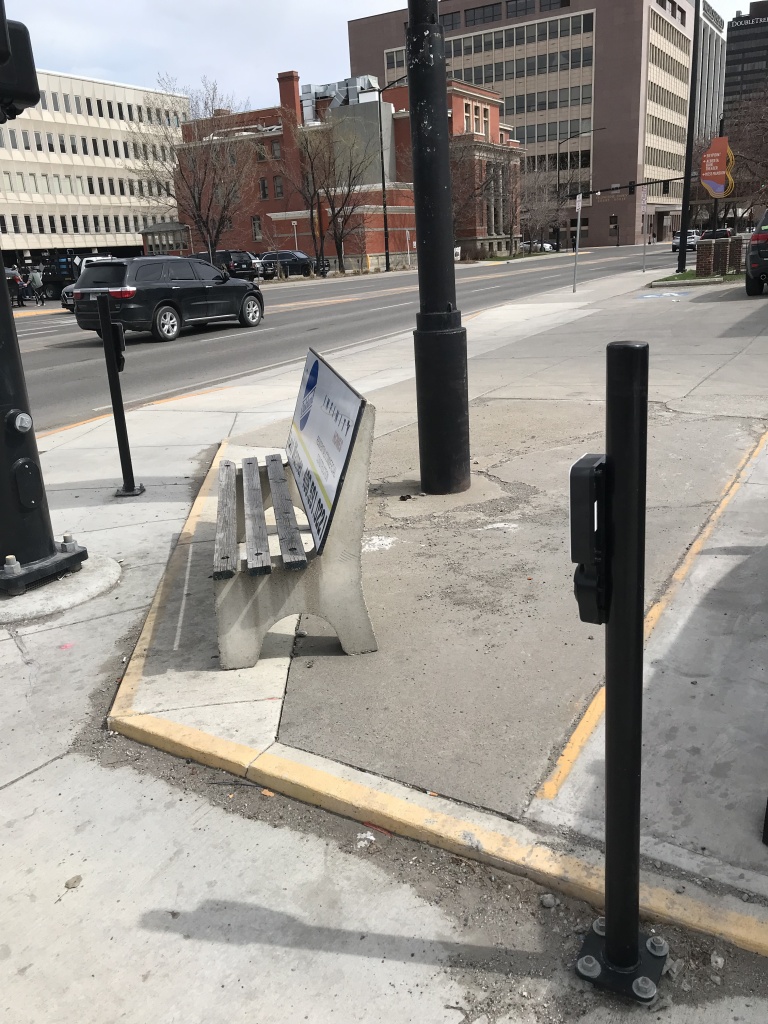
December 21, 2023
Worked steadily the past two days. Volunteered with Catherine Card’s program of providing showers and sometimes clean clothes to people who live on Billings’ streets. Catherine, an old friend of Mark Fryberger’s, said locally, at least 200-400 people have no house, no apartment. The Rescue Mission has rules and restrictions that prevent entry for some folks. The people I met were top notch.
A fellow named Matthieu told me he teams up with several others to watch each others’ possessions. He noted how difficult it is to have to carry more than two pieces of luggage everywhere he goes. They can put all their packs and bags together, then take turns watching them. That way they can get a chance to go in a restaurant without all their stuff.
What if there were lockers where people could store stuff during the day? They don’t seem to exist. In my day bus stations had lockers. You put in some quarters, stowed your gear, and kept the key to retrieve the stuff later.
